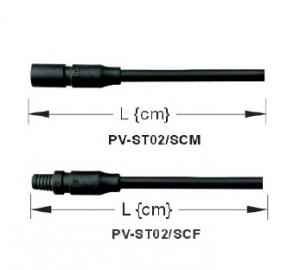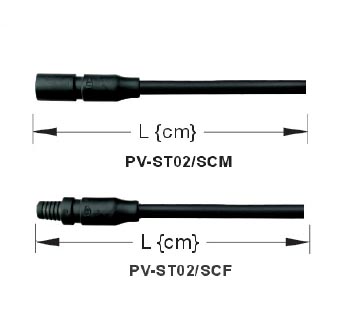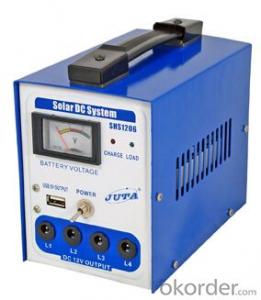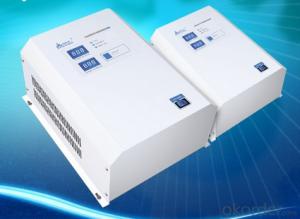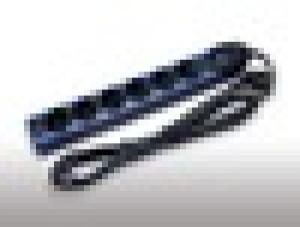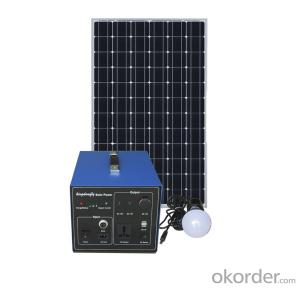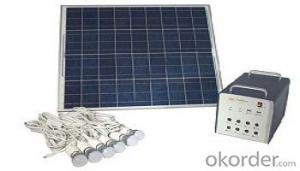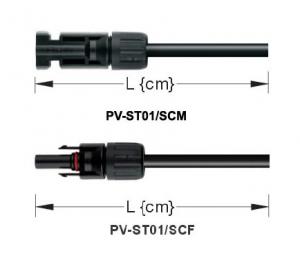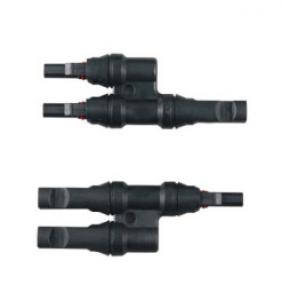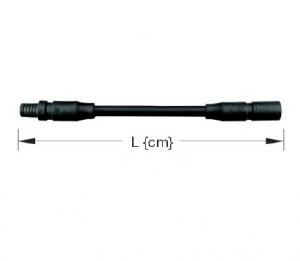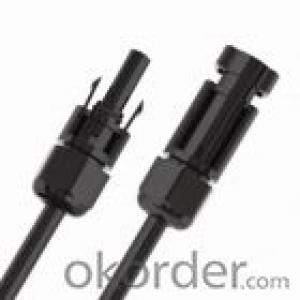Ses Solar Energy Systems PV-ST02 SCM SCF Solar Cable Connector
- Loading Port:
- China Main Port
- Payment Terms:
- TT OR LC
- Min Order Qty:
- -
- Supply Capability:
- 10000 set/month
OKorder Service Pledge
OKorder Financial Service
You Might Also Like
Solar Cable-Connectors,Due to highly robustness,UV-resistance,the touch protection a high grade connection is guaranteed for many years
Rated voltage 1000 V
Rated current 20A
Dia.of pin or socket 3mm
Protection degree(mated,junction box closed/unmated) IP67/IP2X
Operating temperature -40 °c to +85 °c
Contact material Copper,silver plated
Cable cross on request: 2.5mm2 4mm2
- Q: Can solar energy systems be used for commercial buildings?
- Yes, solar energy systems can be used for commercial buildings. In fact, many businesses are adopting solar power as a sustainable and cost-effective energy solution. Solar panels can be installed on rooftops or as ground-mounted systems to generate electricity, reducing reliance on traditional energy sources and lowering utility bills. Additionally, commercial buildings often have large surface areas suitable for solar panel installation, making them ideal candidates for harnessing solar energy.
- Q: Can solar energy systems be installed on historic buildings?
- Yes, solar energy systems can be installed on historic buildings. However, it is crucial to carefully consider the design and installation process to ensure minimal visual impact and preservation of the building's historic character. Additionally, the installation should be done in compliance with local regulations and guidelines to protect the architectural integrity of the historic structure.
- Q: What is the role of solar trackers in solar energy systems?
- The role of solar trackers in solar energy systems is to optimize the efficiency and output of solar panels by tracking the movement of the sun throughout the day. Solar trackers automatically adjust the position of the panels to ensure that they are always facing the sun at the optimal angle, maximizing the absorption of sunlight and increasing the overall energy generation of the system.
- Q: Can solar energy systems be used in areas with limited technological infrastructure?
- Yes, solar energy systems can be used in areas with limited technological infrastructure. Solar energy systems are often modular and can be easily installed and maintained. They do not require a complex grid infrastructure or extensive technical expertise. Additionally, advancements in solar technology have led to the development of off-grid solar solutions, such as solar lanterns and portable solar panels, which can provide basic energy needs in remote areas. Therefore, solar energy systems offer a viable and sustainable solution for areas with limited technological infrastructure.
- Q: How often do solar panels need to be cleaned or maintained?
- Solar panels typically require minimal maintenance and cleaning. In most cases, they only need to be cleaned once or twice a year, depending on the location and climate. Regular inspections and light cleaning can help ensure optimal performance and efficiency of solar panels.
- Q: What is the maintenance process for solar panels?
- The maintenance process for solar panels typically involves regular cleaning, inspection, and occasional repairs. Cleaning the panels is important to ensure they receive maximum sunlight and maintain optimal efficiency. This can be done by using a soft brush or cloth and mild detergent to remove dirt, dust, and debris. It is essential to avoid using abrasive materials or harsh chemicals that could damage the panels. Regular inspection is crucial to detect any potential issues or damages. This includes checking for loose connections, cracks, or any signs of wear and tear. Inspections can be done by the homeowner or a professional solar panel technician. It is recommended to inspect the panels at least once or twice a year, or after severe weather conditions. In case any repairs are needed, it is advisable to contact a professional technician or the manufacturer. They will have the expertise to safely handle any repairs or replacements that may be required. It is important not to attempt repairs unless trained to do so, as this could potentially cause further damage or pose a safety risk. Additionally, monitoring the performance of the solar panels is essential. Many modern solar panel systems come with monitoring tools that allow homeowners to track their energy production and identify any potential issues. Regularly reviewing this data can help identify any drops in efficiency or irregularities, which can be addressed promptly. Overall, a well-maintained solar panel system can have a lifespan of 25 years or more. By following a regular maintenance routine, homeowners can ensure their solar panels continue to generate clean and renewable energy efficiently.
- Q: Are there any government incentives or tax credits for installing a solar energy system?
- Installing a solar energy system comes with a range of government incentives and tax credits that aim to promote renewable energy and reduce reliance on fossil fuels. One notable incentive is the federal Investment Tax Credit (ITC), which enables homeowners and businesses to deduct a portion of their solar system installation costs from their federal taxes. As of 2021, the ITC offers a 26% tax credit for both residential and commercial solar installations. However, it's important to be aware that this percentage may change in the future, so it's wise to seize the opportunity while the current rate applies. Moreover, various states and local governments provide their own incentives and tax credits for solar installations. These incentives can differ significantly, but commonly involve rebates, grants, or exemptions from property taxes for individuals and businesses that adopt solar energy systems. Additionally, numerous states offer net metering programs that enable solar system owners to receive credits on their utility bills for any surplus electricity they generate and feed back into the grid. This allows owners to offset their electricity costs and potentially earn money by selling excess energy. In summary, there exists a plethora of government incentives and tax credits for solar energy system installations. Their purpose is to make solar installations more affordable and encourage the transition to clean, renewable energy sources. To fully comprehend and benefit from the available incentives and credits in your area, it is advisable to consult local authorities, utility companies, and tax professionals.
- Q: Can solar energy systems be installed on historical buildings?
- Yes, solar energy systems can be installed on historical buildings. However, it is important to consider the architectural integrity and preservation of the building. The installation must be done in a way that minimizes any visual or structural impact on the historical value of the building. Modern solar panels can be designed to blend with the aesthetics of the building or placed in less visible areas. Additionally, it may be necessary to obtain proper permits and approvals from relevant authorities before installing solar energy systems on historical buildings.
- Q: How does the efficiency of solar panels vary across different installation locations?
- The efficiency of solar panels varies across different installation locations due to various factors such as the amount of sunlight received, the angle and orientation of the panels, shading, temperature, and local weather conditions.
- Q: Can solar energy systems be used for agricultural applications?
- Yes, solar energy systems can be used for agricultural applications. Solar panels can be used to power various agricultural operations such as irrigation systems, water pumps, and electric fences. Additionally, solar energy can be used in greenhouses to provide heating, lighting, and ventilation. Overall, utilizing solar energy in agriculture can help reduce reliance on traditional energy sources and contribute to sustainable farming practices.
Send your message to us
Ses Solar Energy Systems PV-ST02 SCM SCF Solar Cable Connector
- Loading Port:
- China Main Port
- Payment Terms:
- TT OR LC
- Min Order Qty:
- -
- Supply Capability:
- 10000 set/month
OKorder Service Pledge
OKorder Financial Service
Similar products
Hot products
Hot Searches
Related keywords
